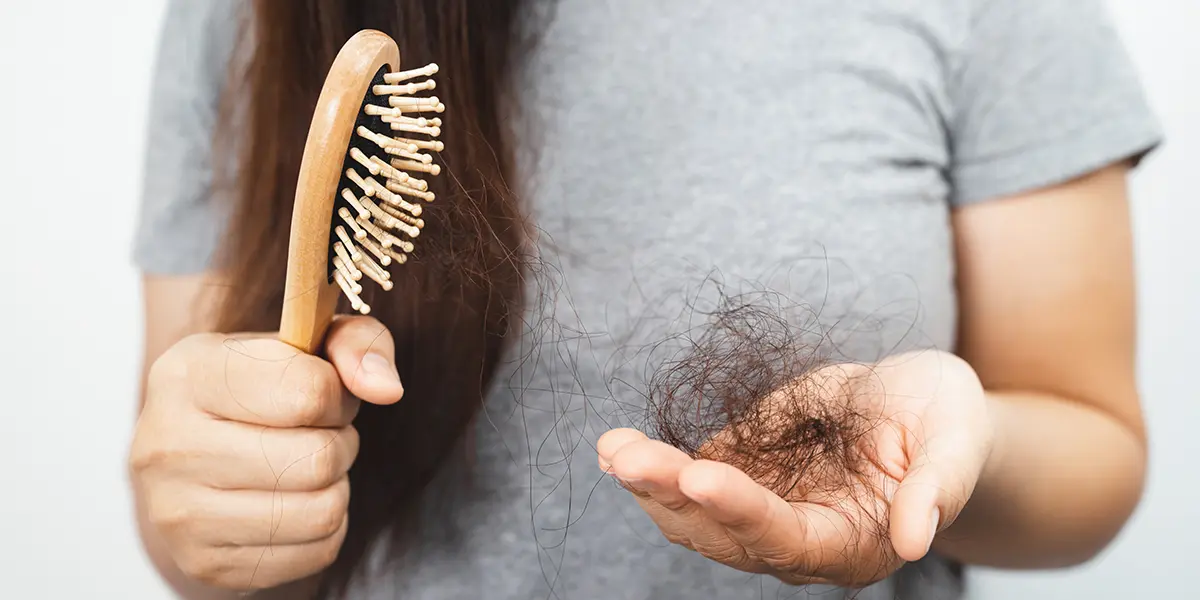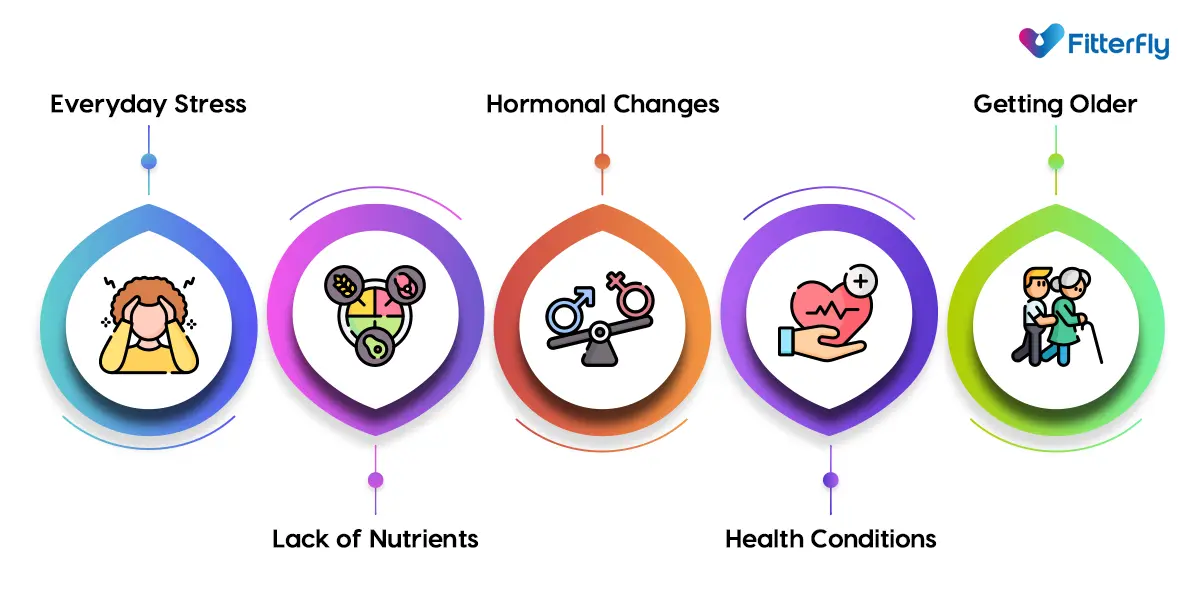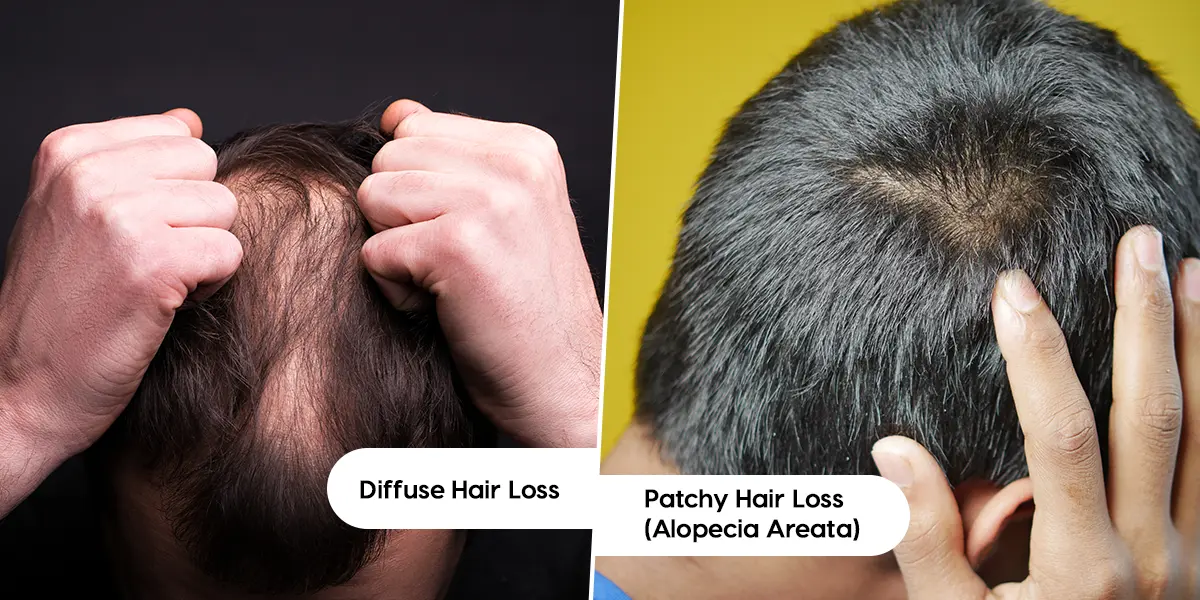Can Diabetes Cause Hair Loss?

Nowadays, most people experience hair loss, regardless of health conditions or gender. At some point, many find themselves clueless as to why this is happening.
While a few seek a doctor’s advice, most don’t, assuming it’s just due to environmental factors or daily stress. However, there are many reasons why hair loss happens, including underlying health conditions like diabetes.
If you have diabetes, you might wonder whether it’s linked to your hair loss. While diabetes and hair loss can sometimes be connected, it’s not always the primary cause.
Factors such as hormonal imbalances, blood circulation issues, and stress can play a role in hair loss among people with diabetes. Still, it’s essential to consult with your doctor to determine the exact cause, as many other factors, like nutrient deficiencies or age, could be at play.
Let’s first see why hair loss happens.
Why Does Hair Loss Happen?
Hair loss can feel like a mystery. One day, you’re going about your usual routine and the next, you might notice more hair in the shower or on your pillow.
So, why does this happen? Hair loss can result from several factors, and it’s often a mix of lifestyle, health, and genetics. In some cases, it’s temporary, and in others, it may need more care to manage.
Understanding the possible reasons can help you address the cause directly, whether it’s something as simple as a diet change or more complex, like a health condition.
What Are the Common Reasons for Hair Loss?

There are many everyday reasons for hair loss that affect people regardless of age or gender. Here’s a look at what might be causing your hair to thin:
1. Everyday Stress
Whether it’s from work, personal issues, or even just the fast pace of life, stress affects almost everyone. Stress can put a strain on your body, impacting the natural hair cycle and leading to extra shedding. Known as telogen effluvium, this kind of hair loss is usually temporary but can still feel unsettling.
2. Lack of Nutrients
Hair needs a mix of nutrients to stay strong and healthy. If your diet is low in essentials like iron, zinc, vitamin D, or biotin, you might notice more hair falling out. This can happen if you skip meals, follow a restricted diet, or simply don’t get enough variety in your food choices.
3. Hormonal Changes
Hormones have a big impact on hair growth, and shifts can happen at any stage of life. Changes in thyroid function or hormone levels from puberty, pregnancy, or menopause can make hair thinner or weaker.
4. Health Conditions
Certain health issues can also affect hair health. Conditions like diabetes, autoimmune disorders, or scalp problems like dandruff and infections can interfere with the hair growth cycle, leading to more shedding or slower regrowth.
5. Getting Older
As we get older, hair naturally becomes finer and grows more slowly. This gradual thinning is common and often noticed more as people reach their 40s and beyond.
Understanding these common causes can help you take the right steps to manage or reduce hair loss effectively. To know the exact reason behind your hair loss, it’s best to get in touch with your doctor or a dermatologist for personalized advice.
To know your chances of Diabetes reversal, take the Diabetes Reversal TestDiabetes Reversal
Calculator
Is Hair Loss a Sign of Diabetes?
Diabetes can sometimes be connected to hair loss, though it’s not always the direct cause. When blood sugar levels are high, they can impact blood circulation, which means less blood flow reaches the hair follicles.
Hair needs a steady supply of nutrients and oxygen from the blood to stay healthy and grow. With poor circulation, the growth phase of hair can be cut short, leading to more shedding and slower regrowth.
In addition, diabetes-related stress and hormonal imbalances may also play a role. High stress levels, common with managing diabetes, can affect the hair cycle and lead to extra shedding. Similarly, hormonal imbalances linked to diabetes can weaken hair over time.
What are the Types of Diabetes-Related Hair Loss?


Diabetes-related hair loss can show up in different ways, depending on your overall health and blood sugar control. Here are a couple of common types:
1. Diffuse Hair Loss
This is when hair gradually thins across the whole scalp rather than in patches. It’s often linked to poor blood flow and nutrient deficiencies that can come with prolonged high blood sugar levels. This type of hair loss is usually gradual and may make hair feel less full over time.
2. Patchy Hair Loss (Alopecia Areata)
Sometimes, people with diabetes experience hair loss in small, round patches. This condition, known as alopecia areata, is more common in those with autoimmune conditions.
Although it’s not directly caused by diabetes, diabetes can increase the risk of developing autoimmune issues, which might lead to patchy hair loss.
If you notice unusual hair loss, it’s best to talk to your doctor to determine what might be causing it and find the right way to address it.
Is Hair Loss from Diabetes Reversible?
Hair loss from diabetes can sometimes be managed and even partially reversed, especially if high blood sugar levels are brought under control. When blood sugar is stable, circulation improves, which helps deliver more nutrients and oxygen to the hair follicles, supporting healthier hair growth.
However, if hair loss is related to other factors, such as hormonal imbalances, stress, or autoimmune conditions, managing it might require a more targeted approach, like specific treatments or lifestyle adjustments.
Reduced HbA1c by HALF in 6 months


6.6%
Happy members
EMI
Guarantee
4.8/5
Diabetes Prime Program
How to Prevent Hair Loss from Diabetes?
If you have diabetes and are experiencing hair fall, or anytime you notice something unusual with your hair, it’s essential to talk to your doctor first. They can assess your condition and recommend a treatment or prevention plan.
In some cases, they may suggest seeing a dermatologist for a more precise analysis of your hair and scalp health. Your doctor can guide you on the best solutions to prevent hair loss, including lifestyle adjustments that support both your hair and overall health. Here are a few practical steps you can take to help prevent hair fall:
1. Eat Nutrient-Rich, Balanced Meals
A diet rich in essential nutrients provides your hair with what it needs to grow strong and healthy. Try to include micronutrient-dense foods that are high in iron, zinc, vitamin D, and biotin.
For example, spinach, amla (Indian gooseberry), pumpkin seeds, carrots, and pomegranate are excellent for maintaining hair health. Add proteins from sources like eggs, lentils, and chickpeas, and include nuts like almonds and walnuts, which support strong hair and overall nutrition.
2. Maintain Nutritional Balance
A well-rounded diet with a balance of carbs, protein, and healthy fats gives your body energy and supports hair health. Avoid extreme diets or skipping meals, as these can lead to nutrient deficiencies, weakening hair over time.
3. Practice Good Hair Care
Gentle care goes a long way in maintaining hair health. Wash your hair regularly using a mild & sulphate free shampoo and condition it to prevent dryness.
Weekly oil massages with coconut or almond oil can improve blood circulation to the scalp, nourishing hair follicles. When outdoors, especially in the sun or dust, cover your hair with a scarf or hat to protect it from harsh elements.
4. Manage Stress
Stress can impact both your hair and diabetes. Activities like deep breathing, yoga, and meditation can help you stay calm and reduce the effects of stress on your body. Taking a few minutes daily to unwind can make a big difference.
5. Sleep Well
Good sleep is essential for recovery and overall health. Try to get 7-8 hours of quality sleep each night, as this helps balance hormones, reduces stress, and supports hair growth.
6. Exercise Regularly
Physical activity, including yoga or walking, improves blood circulation, including to the scalp. Exercise also helps manage blood sugar levels, which benefits hair health and strengthens your overall body.
When to See a Doctor?
If you’re experiencing significant hair loss or notice patches of baldness, it’s best to consult a doctor. They can help determine whether it’s due to diabetes or other factors, such as hormonal imbalances or autoimmune conditions.
How We At Fitterfly Can Help You?
If you’ve noticed any unusual hair loss and have diabetes, it’s essential to speak with your doctor first. They can evaluate your situation, recommend the most effective solution, and may even advise seeing a dermatologist for a more thorough analysis.
While diabetes is often a minor cause among many other reasons for hair loss, effective diabetes management can help reduce such issues. This is where Fitterly comes in to manage your diabetes better.
At Fitterfly, we’re here to help you manage your diabetes with a comprehensive approach. Our team of experts work together to help you achieve a healthier, more balanced lifestyle.
Our Nutrition coaches focus on creating a diet plan rich in essential nutrients that are key to your overall health, including hair health. They help you make meal choices that keep your blood sugar in check and support your well-being.
Our Fitness coaches guide you in maintaining a balanced approach to staying active, which is essential for stable blood sugar, improved circulation, and reduced stress, benefiting both your hair and overall health. Our Success coaches provide ongoing support and motivation, helping you tackle challenges, manage stress, and stay committed to your goals.
Through this integrated approach, Fitterfly empowers you to take control of your diabetes in a way that also positively impacts your hair health and overall vitality. Give us a missed call at 08068507599 to know more how we can help you better with diabetes management.
This blog provides general information for educational and informational purposes only and shouldn't be seen as professional advice.
Frequently Asked Questions
Will medication cause hair loss?
Yes, certain medications, like those used for cancer treatment, can lead to hair loss. Other types of medications, such as those for high blood pressure, depression, arthritis, and hormonal imbalances, may also contribute to hair thinning or shedding. This hair loss is often temporary and may improve once the medication is discontinued, though this depends on the type of medication and individual response. Speak with your doctor, as they can suggest the most suitable treatment for you and may recommend consulting a dermatologist for targeted hair loss solutions if needed.
How can you prevent hair loss from diabetes?
Maintaining stable blood sugar levels, eating a nutrient-rich diet, managing stress, and practicing good hair care can all support hair health. If hair loss persists, consult with a dermatologist for additional guidance.
Can high blood sugar levels cause hair loss?
Yes, high blood sugar can impact circulation and damage blood vessels, which may reduce nutrient flow to hair follicles, potentially contributing to hair thinning over time.
What does hair loss from diabetes look like?
Diabetes-related hair loss often appears as gradual thinning across the scalp (diffuse thinning). In cases where autoimmune conditions are present, it may show up as small bald patches, known as alopecia areata.
Why do diabetes people lose hair on their legs?
Poor blood circulation, which can be common in diabetes, may reduce hair growth on the legs, leading to hair loss in that area.
What is the cause of alopecia areata?
Alopecia areata is an autoimmune condition where the immune system attacks hair follicles, causing patchy hair loss. Although not directly caused by diabetes, people with diabetes have a higher risk of developing autoimmune conditions.




















